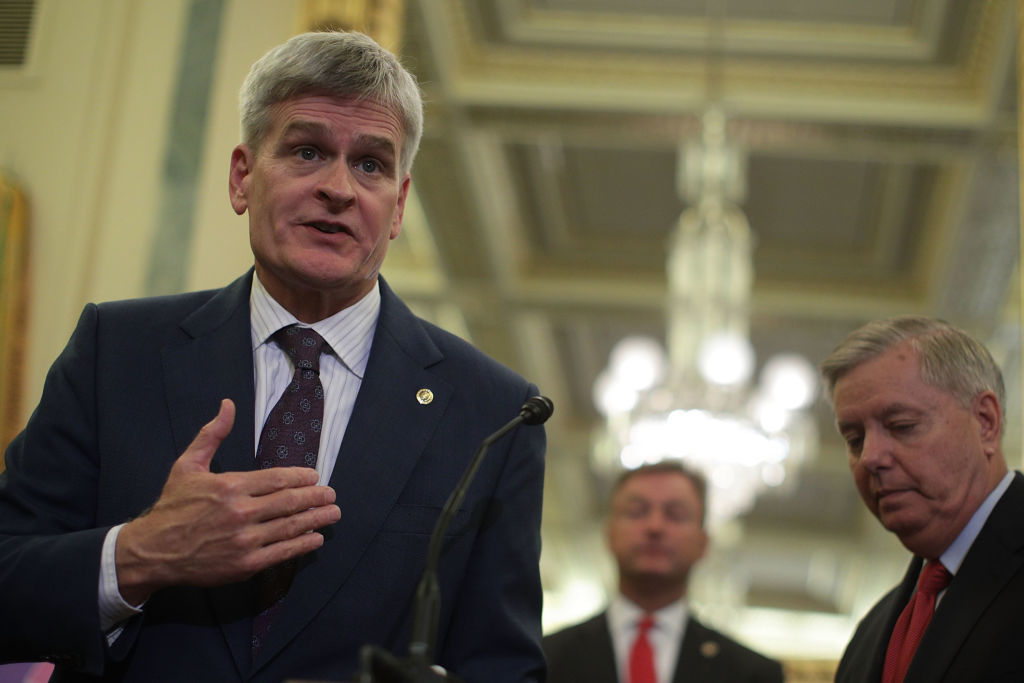State Medicaid directors join the groups opposed to the GOP's Graham-Cassidy bill


On Thursday, the National Association of Medicaid Directors (NAMD), a group representing the Medicaid directors from all 50 states, joined other medical and patient advocacy groups in opposing the latest Senate Republican bill to repeal the Affordable Care Act, named after sponsors Sens. Lindsey Graham (R-S.C.) and Bill Cassidy (R-La.). The bill would scrap ObamaCare's subsidies for consumers and Medicaid expansion and redistribute that money as state grants, in what the NAMD board of directors calls "the largest intergovernmental transfer of financial risk from the federal government to the states in our country's history."
The Medicaid directors said they don't want that risk, especially without being consulted first, and they called a Congressional Budget Office score — which Graham-Cassidy won't have before voting — "the bare minimum required for beginning consideration." Setting up entire new health-care programs in 50 states requires an enormous amount of work and resources, NAMD said, and "the vast majority of states will not be able to do so within the two-year timeframe envisioned here, especially considering the apparent lack of federal funding in the bill to support these critical activities."
Andy Slavitt, administrator of the Centers for Medicare and Medicaid Services from 2015 until January and an opponent of repealing ObamaCare, said all 50 Medicaid directors coming out against Graham-Cassidy was "very unusual," and Sen. Chris Murphy (D-Ct.), was similarly impressed:
The Week
Escape your echo chamber. Get the facts behind the news, plus analysis from multiple perspectives.

Sign up for The Week's Free Newsletters
From our morning news briefing to a weekly Good News Newsletter, get the best of The Week delivered directly to your inbox.
From our morning news briefing to a weekly Good News Newsletter, get the best of The Week delivered directly to your inbox.
The Senate plans to vote on the bill next week. You can read the NAMD's full statement here.
A free daily email with the biggest news stories of the day – and the best features from TheWeek.com
Peter has worked as a news and culture writer and editor at The Week since the site's launch in 2008. He covers politics, world affairs, religion and cultural currents. His journalism career began as a copy editor at a financial newswire and has included editorial positions at The New York Times Magazine, Facts on File, and Oregon State University.
-
 ‘Let 2026 be a year of reckoning’
‘Let 2026 be a year of reckoning’Instant Opinion Opinion, comment and editorials of the day
-
 Why is Iran facing its biggest protests in years?
Why is Iran facing its biggest protests in years?TODAY’S BIG QUESTION Iranians are taking to the streets as a growing movement of civic unrest threatens a fragile stability
-
 How prediction markets have spread to politics
How prediction markets have spread to politicsThe explainer Everything’s a gamble
-
 Nobody seems surprised Wagner's Prigozhin died under suspicious circumstances
Nobody seems surprised Wagner's Prigozhin died under suspicious circumstancesSpeed Read
-
 Western mountain climbers allegedly left Pakistani porter to die on K2
Western mountain climbers allegedly left Pakistani porter to die on K2Speed Read
-
 'Circular saw blades' divide controversial Rio Grande buoys installed by Texas governor
'Circular saw blades' divide controversial Rio Grande buoys installed by Texas governorSpeed Read
-
 Los Angeles city workers stage 1-day walkout over labor conditions
Los Angeles city workers stage 1-day walkout over labor conditionsSpeed Read
-
 Mega Millions jackpot climbs to an estimated $1.55 billion
Mega Millions jackpot climbs to an estimated $1.55 billionSpeed Read
-
 Bangladesh dealing with worst dengue fever outbreak on record
Bangladesh dealing with worst dengue fever outbreak on recordSpeed Read
-
 Glacial outburst flooding in Juneau destroys homes
Glacial outburst flooding in Juneau destroys homesSpeed Read
-
 Scotland seeking 'monster hunters' to search for fabled Loch Ness creature
Scotland seeking 'monster hunters' to search for fabled Loch Ness creatureSpeed Read
